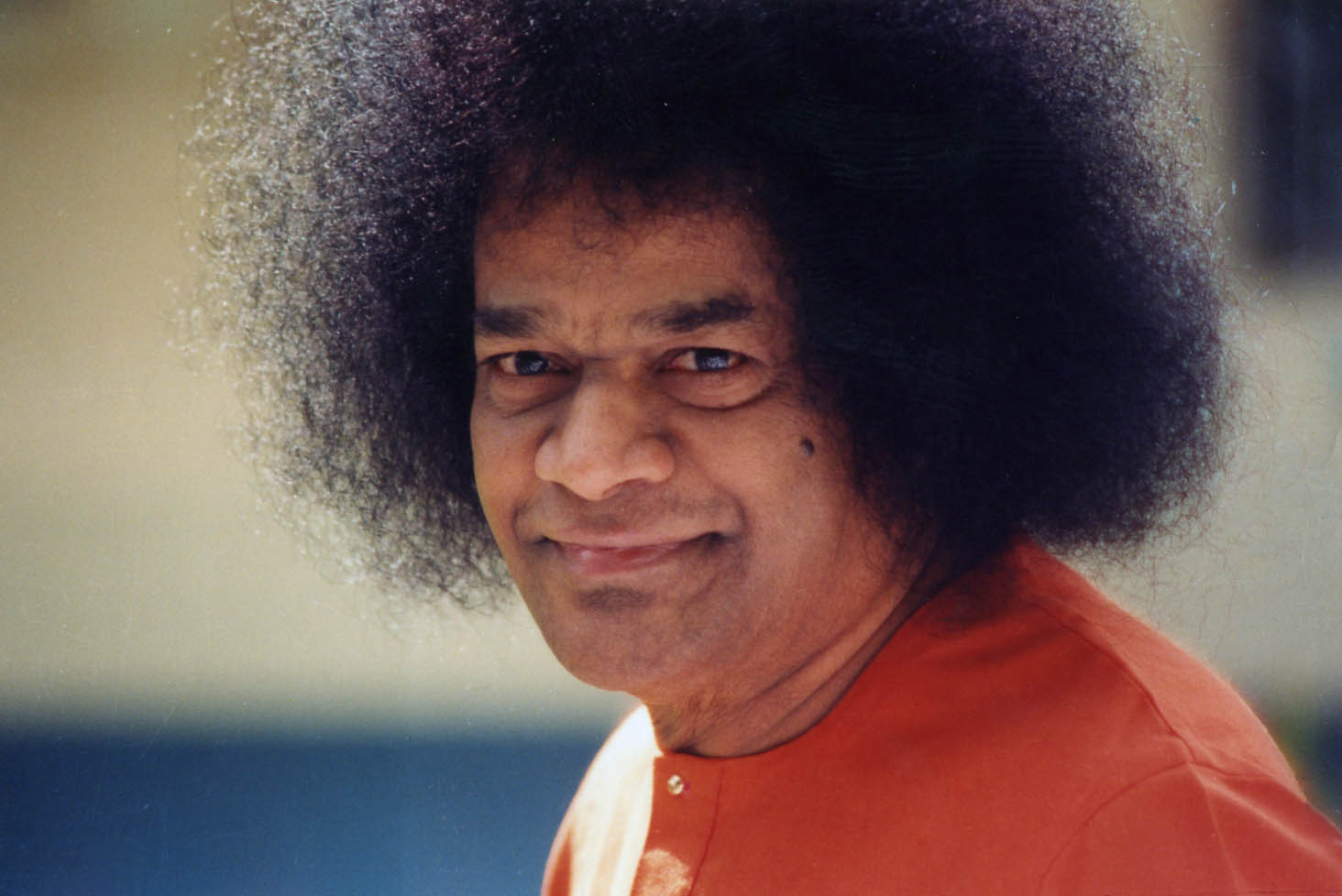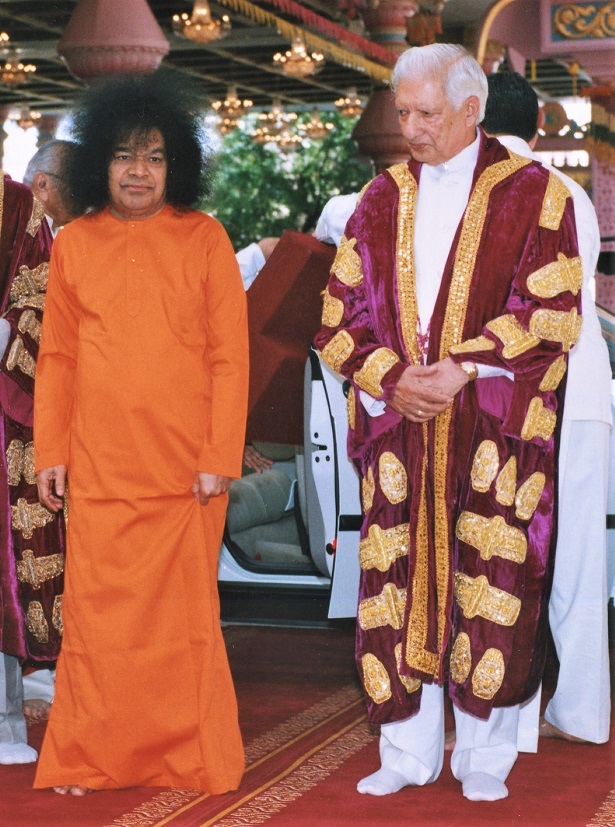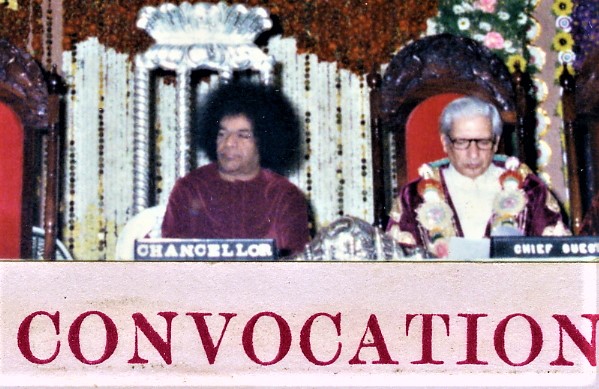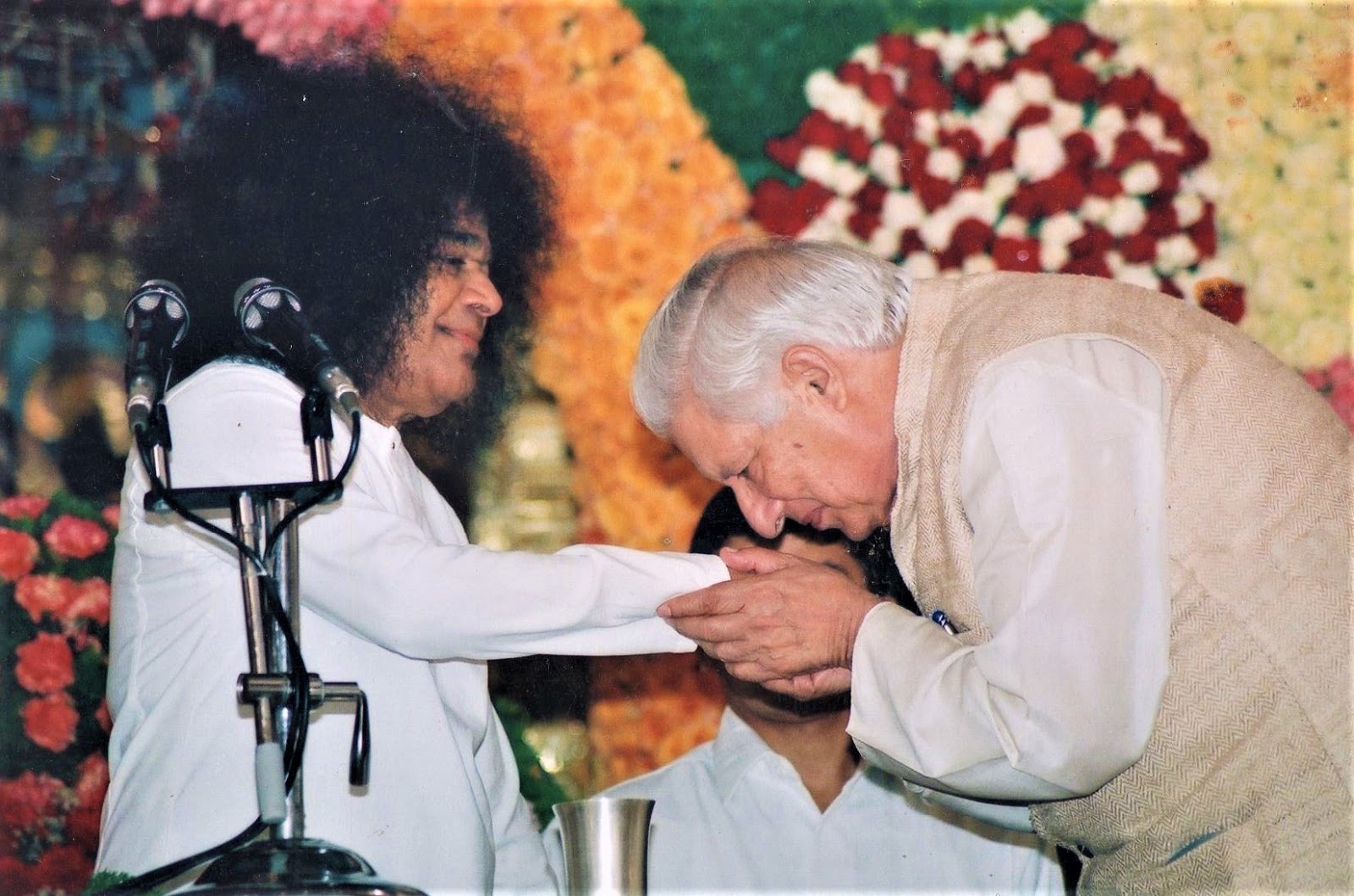


The first ever face-to-face meeting with Bhagavan Sri Sathya Sai Baba took place on 2 July 1972. The scene is etched in my mind. I had waited in the Principal's drawing room at the Sri Sathya Sai College for Women at Anantapur for about an hour when Bhagavan entered the room and greeted me with the words; "So, you have come". He seated me next to Him on the sofa and a long conversation followed which left me in no doubt about Bhagavan's divinity and his Omni-science. But after I left Him to make my way back to Bangalore I kept saying to myself, He is Avatar alright, but what is He doing wasting His time and energy on running a college for girls in a remote little town in Andhra Pradesh.
Anantapur College had been in existence for three or four years; it was a modest institution affiliated to one of the Andhra Pradesh Universities. Bhagavan had spent a good part of the morning of my interview with Him giving directions concerning the final touches being given to the college auditorium. The Principal had briefly mentioned to me that the college building had been designed by Bhagavan Himself and that He had supervised its construction in every detail. I had met one or two of the teachers had also seen a few of the girl students going about their work. They struck me as quite different from the students and teachers one comes to across in India's colleges. The general environment was markedly serene, and there was enchantment in the very air of the place.
In the course of our meeting, Bhagavan had briefly mentioned the importance of education and the awful state to which education in India had fallen. I remember speaking to Him of my work as a diplomat and of some of the more disturbing features of the world scene. The world will change", Bhagavan had said, "but we must take care of India first; a lot has to change here. The change will come, but it will take time". Little did I realize then that what I had seen in that small college at Anantapur on the morning of 2 July 1972 were the beginnings of a spiritual revolution to reshape the order of things in the world from the roots.
A prophecy in Ezekiel says that there will be incessant upheaval till the Right Order prevails in the world. All too obviously the prevailing world order is not the Right Order. Fear, suspicion and distrust prevail between nations giving rise to periodic conflict and wars. There are tensions and strife within nations too. Religion, which should be a uniting force is a cause of disunity and discord among men. While faiths multiply, their adherents seem to move away from religion in its basic aspects — belief in God and in the oneness of His creation, respect for life, right conduct, love and the spirit of service and compassion in human dealings. Materialism is rampant; the rich flourish and the poor grow poorer.
The individual is the central fact of existence. Therefore, the key to the Right World Order is the individual human being at harmony with itself. Man is body, mind and spirit; he is at harmony with himself when the three are in balance.
In the ancient Indian civilization, the emphasis was on the spirit being in command, which inclined Indian thinkers to intuitive exploration of man's inner space, the nature and meaning of life and the mystery of God, in short, the Reality or Truth or Sathya. Their spiritual experiences led Indian seers to proclaim the basic unity of humankind and to look at the world as one family.
In the west, man allowed the mind to assert itself over the spirit and indulge the body. As a result, western civilization is oriented towards materialism and rational investigation of the physical phenomena. It is dynamic, disciplined, curious and acquisitive. There are great achievements to its credit in science and technology, in societal organization and in improving man's material condition. But it is deficient in spirituality and its gaze has remained caught in the world's apparent diversity and its material attractions.
The Right Order requires harmony at three other levels as well — the family, the group or society and the nation. Harmony in the family is sustained by love (Prema), in the group or society by righteousness (Dharma) on the part its constituents. Harmony at the national level is the result of peace (Shanti) among the ethnic, cultural and other groups that form part of it. The sum total of harmony at all four levels is a harmonious world at peace with itself, a world without violence and war (Ahimsa).
At the moment harmony is absent in all components of human society. In the west, lack of cohesion and restlessness characterize individual and family life; in India and elsewhere social organization and national life are subject to periodic upheavals. The Right Order will be achieved in the world only when a uniform human civilization develops on the basis of the values of truth, love, righteousness, peace and non-violence.
The period of over a thousand years of the growth, expansion and ascendancy of the Western Civilization is marked by unusual aggressiveness. It saw the institutionalization of evils like racial discrimination, colonial domination and the preponderance of force in human affairs. The politico-strategic doctrines of the Western Civilization example: the balance of power, supremacy of national interest, ideological superiority, total war, deterrence, etc., have caused hundreds of wars culminating in the two calamitous world wars of this century followed by a half century of cold war and the senseless race of nuclear arms. Enormous resources have been wasted in the accumulation of a nuclear arsenal of some 60,000 weapons when 200 would suffice to destroy human life and make the earth uninhabitable.
The nuclear arms race has impoverished even rich and advanced nations. The economies of the Soviet Union and East European countries are in a state of collapse. The U.S.A., the world's richest nation, is deep in debt. There is despair in the countries of the Third World, so-called, over their deepening poverty, rising debt burden, faltering economic development and their internal tensions and conflicts. New problems have arisen which can be handled successfully only through cooperation or the global scale, example, the widening gap and tensions between the rich and the poor nations, the rapidly environmental degradation and nuclear proliferation. The demand of our time is that the world must become one, and there must be peace for humanity's survival and progress.
On the other hand, many uncertainties attend the state of dynamic transition in different regions of the world, especially Europe. The rise of an economically and militarily powerful united German State in the heart of Europe may well lead to new power alignments in that continent not dissimilar to those of the era preceding World War I. In the East, Japan's transformation as an economic and military power of global significance is an accomplished fact. China is gathering strength and will, in any event, be a major force on the international scene because of the size of her area and population. That is true of India as well. Elsewhere too power structures are changing and new powers of varying potential are taking shape in different continents, Australia in the Pacific, Indonesia in South-east Asia, Iraq, Egypt and Israel in the Middle East, Argentina, Brazil and Mexico in Latin America. It is not unlikely that in a decade or two a score of nations will be in possession of nuclear weapons. The prospect in the immediate future would thus appear to be one of greater turbulence with half-a-dozen or so powers competing among themselves, or even cooperating together, for supremacy and dominance over the rest. The United Nations Organization has not been effective in ensuring the security of small countries, nor has it succeeded in forging common purpose and unity in the world. It may prove even less effective in the future unless renewed and reformed. Our divided world with its fragmented human civilizations seems condemned to periodic upheavals.
But in the affairs of humankind there is always the possibility of divine intervention. From Bhagavan Sri Sathya Sai Baba comes the message of hope:
"The world", he says, "is based on Truth and Righteousness. These two maintain the world. If they are protected, the world will be happy and prosperous. Victory will come in the wake of truth and righteousness. No other form of strength, including armed might, will ensure success". Bhagavan Baba goes on to add: “What the world needs is a spiritual transformation. It is the absence of spirituality that accounts for all the chaos, conflict and disorder in the world".

In these simple, direct words, the Avatar offers the assurance that humanity will be saved and also defines His Mission, namely to bring about spiritual transformation of the world by revealing the divine splendor in every human heart.
How will this grand and noble mission be achieved? Since the Avatar has taken birth in our country, INDIA is bound to have some role in its fulfilment. What could that role be? Why did the Avatar choose India for the unfolding of his purpose and his mission?
India is not just a vast tract of land, with a large population and enormous resources, a nation with her many problems and possibilities. India is an unending process of the synthesis of ideas, races, religions, values and cultures; she is both a permanence and a constant becoming. Her culture has survived the many vicissitudes of her history. The secret of India's resilience lies in her capacity to absorb new impacts, to not only tolerate but welcome diversity, and to assimilate fresh influences in such a way that her unity is not weakened but strengthened and her spirituality, which is her primal strength, is not eroded but reinforced. With her spiritual orientation and her powers of synthesis India is well-suited to the task of forging a universal civilization with a common human vision out of the earth's great diversity of races, religions, civilizations and cultures. No other nation or society has the necessary attributes and the experience for the task.
India's independence was one of the most momentous events of this century. It unlocked the voice of a people who were the first to proclaim that all humankind is one family, that the goal of civilization is to create a fellowship of the spirit in the world. The event was of unusual significance also for the manner of its happening. India's independence came about not by way of a bloody revolution but as the fruit, primarily, of the suffering, sacrifice and love of one man, Mahatma Gandhi. All that is good and great in India's spiritual tradition asserted itself in the Mahatma's life and work- recognition of all life as manifestation of the Divine, firm adherence to truth and total renunciation of violence and force in human affairs. He demonstrated that by loving one's opponent it is possible to transform his animosity into sympathy and friendship and that just causes pursued in non-violent ways can prevail over armed might. In the end, the very act of the transfer of power from Britain to India was not a parting of ways but a coming together for cooperation as equal members of the Commonwealth. It was a synthesis of the best in the traditions of India and Britain.
Since independence, we have proffered the vision of an alternative world order to the one fashioned by the rival power blocks. It is the vision of a world based on equality, coexistence and cooperation, where fear is replaced by trust and confidence, hatred by understanding and harmony, and greed by sharing. We have suggested reforms of the United Nations' system to make the world organization a true democracy of nations. We have made proposals for the elimination of Nuclear arms and defined principles on which a world order free from violence and war should be based.
The foreign policy of non-alignment, which grew out of our tradition and the special character of our struggle for independence, has a great majority of the world's countries as if adherents. These initiatives have evoked much interest and a measure of support in the world public. But our domestic social climate and political functioning have many failings. In truth, we have abandoned the Gandhian method in the conduct of our affairs. We are also guilty of neglecting some vital needs of our people.
In today's world no country can hope to make any kind of advance, material or spiritual, without a broad educational base. But after 43 years of independence half our population is illiterate and our educational system in shambles. We must first unfold India's spiritual sources to our own people, we must bring their lives into a decent relationship with the times in which we live. Only then will the world give credence to our professions of concern for humanity's spiritual well-being.
Appropriately, the Avatar has chosen education as the medium for uplift as a first step. For a thousand years, our educational system had remained divorced from the culture of the country. The education the British introduced in India at least placed us in contact with the modern world. In essentials, it was no different from the schooling they had at home, though there it had cultural roots in the local soil. What was needed was to adapt it to our cultural context and to work out a synthesis of our own heritage of learning with modern knowledge. By doing precisely that Bhagavan Sri Sathya Sai Baba has initiated educational reform and a spiritual revolution of far reaching consequence to India and the world. The products of his institutions, from the primary school to the University, are boys and girls of exceptional quality, steeped in the spirit of service, strong of character, disciplined, kind and compassionate, deeply spiritual and progressive in outlook They are the apostles of a new age.
Modern sciences, engineering and other technological subjects form an integral part of the curricula of the Sathya Sai University. What is rejected in Bhagavan Sathya Sai Baba's educational philosophy is not science or the scientific outlook, but the inclination to see the natural universe as a mindless machine and man as an insignificant part of that machine. To modern teaching is added an emphasis on man's divine origins, on oneness of humanity, and on the importance of truth, righteousness, love and service in life. There is no conflict between science and spirituality, between the old and the new: The truths of science and spiritual truths are taught side by side in the Sri Sathya Sai Institute of Higher Learning. In this unique center of learning, a synthesis of western knowledge and Indian spirituality is being worked out for the regeneration and renewal of the Indian Society. This should prepare India, in due course, to resume her Mission, suspended since the beginning of India's political decline in the 10th Century, of bringing the East and West together, of promoting the inner unity of mind and spirit in Man and a common human vision which the rapidly growing closeness of the world demands.

Human civilizations in different parts of the world have developed in their respective historical and other circumstances. The Western Civilization has its own virtues and has made a signal contribution to human development. Following its own course, it too has come to the realization that the spiritual side of man's life is important and ought not to be neglected, that confronted as humanity is with the nuclear peril, world unity is necessary for its survival. If India is to impart her gift of spiritual wisdom to the modern world, the two civilizations will have to meet and blend together in a harmonious whole. For that to happen, India must first relate her perennial wisdom to the modern times by reliving it in her present life. Bhagavan Sri Sathya Sai Baba's synthesis of the old and the modern, of science and culture, in Indian education is of signal importance to the world's future. This educational model should be adopted for application all over India. In its own time the world will see its merit, and it could well become the catalyst for a universal culture rooted in spirituality.
At another level, through the life and work of his individual devotees in far corners of the world, Bhagavan Sri Sathya Sai Baba is generating receptivity to Indian culture and spirituality. He does not undertake foreign tours and it is a mystery how His name and message reach out to faraway lands. The number of his devotees in foreign countries, including the most advanced Western countries, already runs into hundreds of thousands, perhaps millions, and grows by the day. Their lives are models of simplicity, spirituality, devotion and dedication to service. In their respective countries they are the heralds of the Sai Spiritual Revolution.
Thus in mysterious but sure and unmistakable ways the Sai Avatar’s work goes on. His mission will succeed; for an Avatar brooks no hindrance, nor defeat. The world needs a spiritual transformation for the Right World Order — a human Brotherhood free from violence and war — to emerge. It is India's good fortune to be an instrument for the unfolding of the divine design for the achievement of that goal.
Sri Maharaja Krishna Rasgotra of the Indian Foreign Service held several posts during his highly fruitful forty years of service including Ambassador of India to France, Ambassador of India to Nepal; Was Foreign Secretary during 1982-85 and after retirement was also High Commissioner for India to the United Kingdom between 1988 and 1990.
An outstanding diplomat, a talented administrator and educationist of repute and a well-known poet. He has visited Prasanthi Nilayam several times and is a devotee since four decades. He was Chief Guest at the Annual Convocations of the Institute in 1989 and 2004.
Source: Sai Vandana 1990